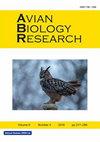Family group structure of the endangered Yellow Cardinal (Gubernatrix cristata)
IF 1.2
4区 农林科学
Q4 AGRICULTURE, DAIRY & ANIMAL SCIENCE
引用次数: 0
Abstract
The monogamous mating system, where a male and a female constitute the reproductive unit and share the parental care, predominates among bird reproductive strategies. However, there are also other mating systems with diverse parental care roles which may have implications for population breeding success and be relevant for their management and conservation. We evaluated the family group structure of the Yellow Cardinal (Gubernatrix cristata) in La Pampa province of central Argentina. During the 2020–2021 breeding season we carried out 280 bird surveys to search for the presence of Yellow Cardinals. We registered 87 individuals (11 solitary individuals, 12 pairs, two males together, and 13 family groups). Most family groups corresponded to the typical monogamous structure, but two family groups (8%) were composed of two adult males, an adult female and at least a juvenile. We also explored 1646 Yellow Cardinal records at citizen science platforms and none of them included a family group with more than two adults. Even so, it would be feasible to release seized groups of two males together, to promote breeding success. Further studies are necessary to evaluate the causes of the presence of extra males and their incidence on the breeding performance of this globally endangered species. This may help to understand its natural history and for planning management and conservation actions. Graphical Abstract濒危黄雀属植物的科群结构
在鸟类的繁殖策略中,一夫一妻制占主导地位,即雄性和雌性组成生殖单位,共同抚育后代。然而,也有其他交配系统具有不同的亲代照顾作用,这可能对种群繁殖的成功产生影响,并与它们的管理和保护有关。我们评估了阿根廷中部拉潘帕省黄红衣主教(Gubernatrix cristata)的家族群结构。在2020-2021年的繁殖季节,我们进行了280次鸟类调查,以寻找黄红雀的存在。我们共登记了87只个体(11只单独个体,12对,2只雄性在一起,13个家庭群体)。大多数家庭群体符合典型的一夫一妻制结构,但有两个家庭群体(8%)由两只成年雄性、一只成年雌性和至少一只幼崽组成。我们还在公民科学平台上研究了1646份黄色红衣主教的记录,其中没有一份包括两个以上成年人的家庭团体。即便如此,为了提高繁殖成功率,将被捕获的两只雄蜘蛛一起放生也是可行的。需要进一步的研究来评估额外雄性存在的原因及其对这一全球濒危物种繁殖性能的影响。这可能有助于了解其自然历史以及规划管理和保护行动。图形抽象
本文章由计算机程序翻译,如有差异,请以英文原文为准。
求助全文
约1分钟内获得全文
求助全文
来源期刊

Avian Biology Research
农林科学-奶制品与动物科学
CiteScore
1.50
自引率
0.00%
发文量
17
审稿时长
2 months
期刊介绍:
Avian Biology Research provides a forum for the publication of research in every field of ornithology. It covers all aspects of pure and applied ornithology for wild or captive species as well as research that does not readily fit within the publication objectives of other ornithological journals. By considering a wide range of research fields for publication, Avian Biology Research provides a forum for people working in every field of ornithology.
 求助内容:
求助内容: 应助结果提醒方式:
应助结果提醒方式:


